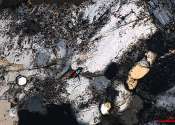Carbon-Nanotube Memory that Really Competes
(PhysOrg.com) -- Researchers in Finland have created a form of carbon-nanotube based information storage that is comparable in speed to a type of memory commonly used in memory cards and USB "jump" drives.

(PhysOrg.com) -- Researchers in Finland have created a form of carbon-nanotube based information storage that is comparable in speed to a type of memory commonly used in memory cards and USB "jump" drives.

Researchers have experimentally demonstrated how to harness a property called negative capacitance for a new type of transistor that could reduce power consumption, validating a theory proposed in 2008 by a team at Purdue ...
Nanophysics
Dec 19, 2017
0
641

JILA researchers have developed a method of spinning electric and magnetic fields around trapped molecular ions to measure whether the ions' tiny electrons are truly round—research with major implications for future scientific ...
General Physics
Dec 5, 2013
1
0

Little is known about the nature and evolution of Earth's continental crust before a few billion years ago because cratons, or stable swaths of the lithosphere more than 2–3 billion years old, are relatively rare.
Earth Sciences
16 hours ago
0
114

Engineering researchers have developed a 2D printing process using liquid metals that they say could create new ways of creating more advanced and energy efficient computing hardware that is manufactured at the nanoscale.
Nanomaterials
Mar 4, 2024
0
21

Hafnium oxide thin films are a fascinating class of materials with robust ferroelectric properties in the nanometer range. While the ferroelectric behavior is extensively studied, results on piezoelectric effects have so ...
Nanophysics
Feb 27, 2024
0
10

The amount of energy used for computing is climbing at an exponential rate. Business intelligence and consulting firm Enerdata reports that information, communication and technology accounts for 5% to 9% of total electricity ...
Materials Science
Oct 11, 2022
0
219

Researchers from the Moscow Institute of Physics and Technology have created a device that acts like a synapse in the living brain, storing information and gradually forgetting it when not accessed for a long time. Known ...
General Physics
Aug 29, 2019
0
543

A new study spearheaded by Earth scientists at the University of Cologne's Institute of Geology and Mineralogy has constrained the age of the Moon to approximately 50 million years after the formation of the solar system. ...
Space Exploration
Jul 29, 2019
13
2151

Using ferroelectricity instead of magnetism in computer memory saves energy. If ferroelectric bits were nanosized, this would also save space. But conventional wisdom dictates that ferroelectric properties disappear when ...
Nanophysics
Oct 22, 2018
1
581